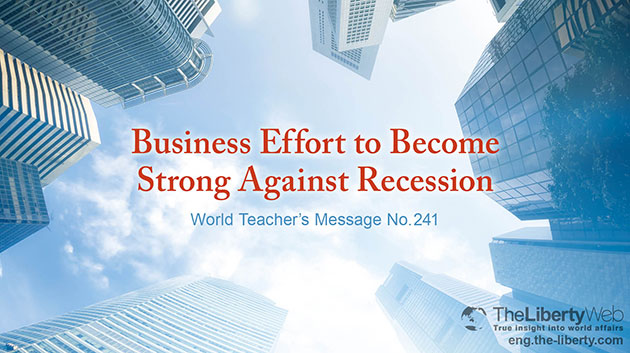Business Effort to Become Strong Against Recession
World Teacher's Message No. 241
I have been a management consultant for 20 years. Amongst the people I have met, there were some businesses that had great visions for the future but found it challenging to obtain results. Please tell us about things that are invaluable for a business to grow.
(Excerpt from a lecture given on 4th September 2011 at Happy Science Tokyo Shoshinkan)
To put it bluntly, those company managers don’t study enough. If they have great dreams and solid faith in God, but can’t bring about growth, it means they don’t study enough.
We can all enter heaven if we have faith, but succeeding in business also requires constant learning. Reading the Bible won’t help you in business.
Most of the ideas you may come up with, everyone can come up with; but through constant studying, you can to get to a level where you are able to come up with ideas that no one else has thought of, and this requires a lot of effort.
A common characteristic among business managers with insufficient study is that they become conceited about their ideas. These people will try out their ideas and, if they don’t achieve the expected results immediately, decide that it won’t be successful.
Inspiration comes very easily at Happy Science, so people may receive inspiration and think, “this is great; it will definitely become a megahit!” But the reality is they haven’t studied quite enough, and perhaps the inspiration came from the one book that the person happened to read.
This lack of study is very common.
Creating New Demand
Another thing is that many managers have long taught themselves to “look for where the demand is”.
But searching for the demand is not enough; in fact we need to “create new demand”. We need to put in the effort to create completely new things that people will come to think of as a necessity.
People get caught up in the thinking that everything that is necessary has already been created, and so everyone starts making and selling the same things.
For instance, I often face my palms toward the audience during my lectures. When I do, the underside of my sleeves show. So when I went to buy cufflinks and the shopkeeper recommended ones with a nice design on the outside, I had to explain that the outside never shows when I give my lectures. Hearing this, the shopkeeper added the same design piece to the underside and said “now people can see the cufflinks from both sides!”
This is professionalism.
Usually no one would buy this sort of product, because showing the underside of the sleeve is very uncommon. When the shopkeeper made these special cufflinks for me, I felt a strong desire to buy them. But I think no one else would.
This is an example of the power of ideas. It is not good enough to just keep selling the same sorts of things. You need to make the effort to start voluntarily creating new things.
To take my previous story, there was never any reason or business rule that cufflinks had to be only one-sided. If there is a demand for something, then you need to respond to it. Some people may even realize the demand is there before the customer expresses it.
So on top of studying, you need to provide services that no other company is providing.
Realizing Your Customers’ Ideas
Sometimes customers give ideas to the seller.
One day I got a call from a company that wanted to sell me a ‘success-in-school-entrance-exams’ wristwatch they had made. They told me, “it has become a hit!” It was a cheap watch, but I bought one for my son who was taking entrance exams.
When they came to deliver the product, I told them “you could make a wristwatch for ‘entering difficult schools’ and another one for ‘success in entering very difficult schools’. Then make it available for a limited time only and raise the price”.
In other words, I suggested they make the same product but in a slightly different way to the original. The delivery person said he thought it was a good idea, so maybe this new product will come out some time soon.
What I’m trying to say is that sometimes the customer gives the seller advice. It takes great effort to try to come up with something that doesn’t exist yet.
That’s why you need to study and search for things that don’t exist yet. It doesn’t necessarily have to require a huge research and development budget, but it really does require effort to squeeze out that never-before-heard-of idea. In the end, the most important thing is to wish for the happiness of your customers.
Investing Is More Important Than Cost-Cutting
What we also need to focus on is management of a slumping business.
The first thing managers probably think of during a business slump is cutting expenses. It begins with restructuring and attrition, then gradually cutting overall expenses, which leads a drop in product quality. This drop in product quality means customers will no longer buy the product. There is always one particular element that should not be reduced, and it is different for each product.
For instance, if a cake store changed their sugar to a cheaper version, it will be immediately obvious. Sugar is an element that cannot be treated half-heartedly. There is always this element that has to be obsessed over no matter what happens.
People who love curry will always know whether enough time has been spent in stewing. They won’t come back if you reduce stewing time to reduce costs.
So there is always a particular element that cannot be taken lightly or reduced. In fact a more clever strategy would be to spend even more money on the important element.
The Market Economy is a Battlefield of Wisdom
People tend to think that profit means “greater income and less expenses”.
Unfortunately this is how the Japanese Ministry of Finance is trying to operate: reduce wasted money and increase tax rates to increase tax revenue and make profit. Even a child could understand this logic.
But the world of capitalism and the market economy is not so simple: competition is intense, people make the most of their wisdom, and those who come up with ideas that no one else does, wins.
And profit comes from the time that it takes for a person’s rivals to discover the secret to their idea. This is another place where effort comes into the equation.
Of course there are places where spending is wasted, and this must be reduced. However, there are also places that must not be reduced and must be added to and increased instead. [To the questioner] As a consultant it is important to be able to talk about these things.
So companies may make various different things, but in places where reduction should not happen, you must make the decision to raise the quality.
Training to See Yourself Through Your Customer’s Eyes
Trust is easily destroyed. It is difficult to establish and increasing it is even harder, but when it collapses it can collapse in a single day. The speed of trust crumbling away is unbelievably fast.
So it is very important to maintain good intentions, and also very difficult.
You have to have enough professionalism to think about your customers’ happiness even after they have bought your product. People who lose interest in their customers after they buy the product are no good. Running away from your previous customers means that you feel guilty towards them. You would only want to run away if you are afraid the customer will discover a hidden defect.
You must be able to see your customers many times. Having good intentions in your work is very important, and there is room for effort here. [To the questioner] This sort of advice creates added value to your work as a consultant, and would lift it up a level.
I have written this in many of my books, but business managers and owners tend to become ‘geocentric’ and put themselves in the centre of everything.
You need to keep teaching them that they must try to stand in their customer’s position to assess their business: in other words, “how would the customer see your services?” It is very easy to forget this important point.
The same could be said for Happy Science. It is ‘training to see yourself from an objective viewpoint’.
For instance, my having chosen a consultant as a questioner in this Q&A session means that I have very good assessment skills [laughs]. Because I chose a consultant, everyone has gained from my answer.
And this questioner came prepared with a proper question [audience laughs]. The questioner had a very interesting banner when everyone was raising his or her hands. I chose him in admiration of this idea.



















